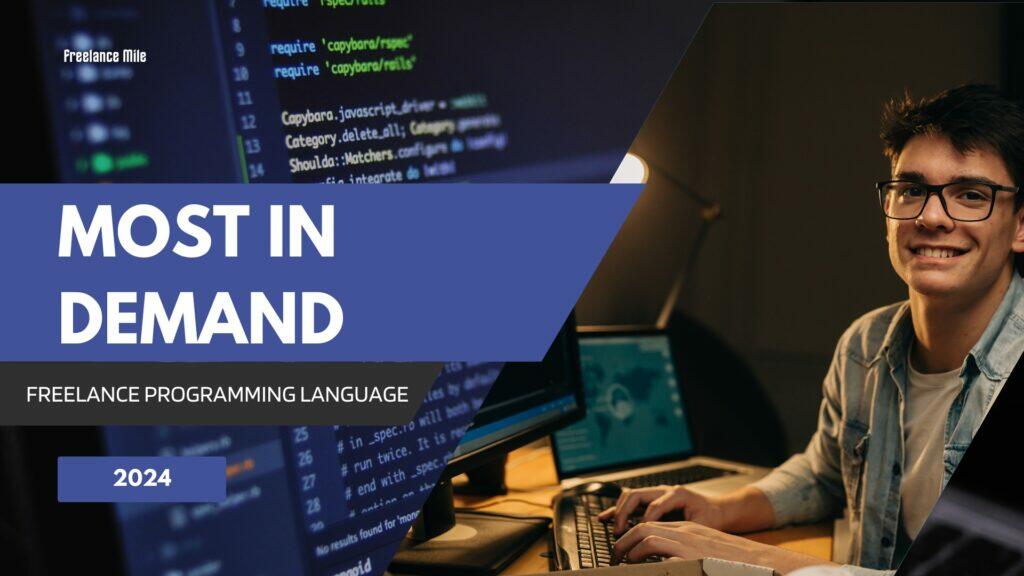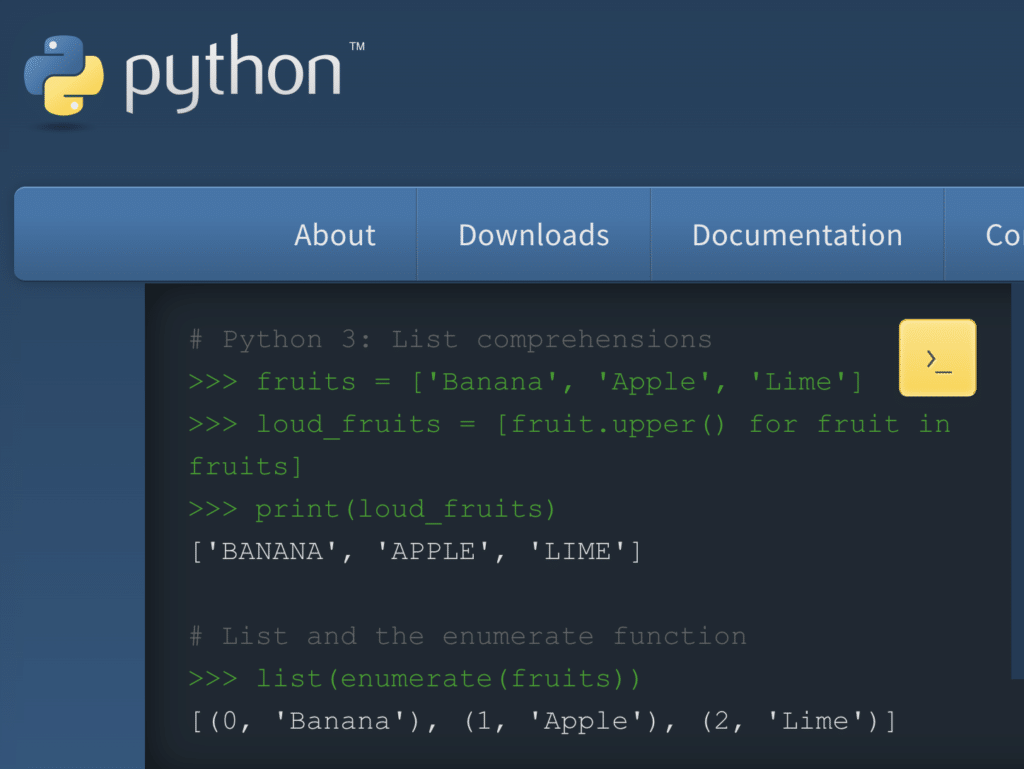As we step into 2024, the most in demand freelance programming language is Python, heralded for its versatility in web development, data science, artificial intelligence, and more. However, it doesn’t stand alone; languages like JavaScript, Java, and SQL continue to shape the freelance landscape significantly.
For a comprehensive dive into each language’s specifics and why they’re your best bet for a successful freelance career, follow the article below where we outline everything you need to know about becoming a skilled freelance developer in today’s market.
Key Takeaways
- Python leads the 2024 pack as the best programming language for freelancers, thanks to its broad application range.
- JavaScript and Java remain cornerstones within the programming languages domain, empowering web and mobile app development.
- A deep dive into the criteria determining the most in demand freelance programming language will help tailor your skill set strategically.
- The emergence of newer languages like Rust and TypeScript introduces fresh freelance opportunities in software engineering and development.
- Staying ahead means keeping an eye on futuristic technologies like blockchain and VR/AR, and the languages that drive them like Solidity and Swift.
- Pursuing a career as a freelance programmer involves more than just coding—it’s about aligning with market demand and tech trends.

The Most in Demand Freelance Programming Language for 2024
As of 2024, the most in-demand freelance programming languages are:

1. Python: Python is a multipurpose language with extensive libraries, making it ideal for various applications, including web development, data analysis, artificial intelligence, and machine learning.
2. JavaScript: As the spine of web development, JavaScript remains a top choice for freelancers seeking high-paying opportunities.
3. Go (Golang): Go is well-suited for building large-scale distributed systems, microservices, and cloud-based applications, making it in high demand.
4. Ruby on Rails: Known for its developer-friendly nature and rapid development capabilities, Rails is commonly used to build web applications.
5. Swift: Swift is the go-to language for iOS and macOS app development, with a dedicated ecosystem and a growing number of Android users.
6. Kotlin: Kotlin is officially supported for Android app development by Google and has gained significant momentum in the mobile development domain.
7. Rust: Rust is a powerful systems programming language known for its memory safety and performance, making it popular in industries such as blockchain, gaming, and security.
These languages are in high demand due to their relevance to emerging technologies, their ability to build scalable and efficient solutions, and their compatibility with popular frameworks and platforms.
Below is an additional snapshot overview of the languages that you should consider:
| Language | Area of Application | Notable Feature |
| Python | Data Science, Machine Learning, AI, Web Development | User-friendly Syntax |
| Rust | Systems Programming | Memory Safety |
| JavaScript | Web Development, Frontend/Backend | Universal Web Use |
| Java | Enterprise Applications, Android Development | Cross-platform Capabilities |
| Golang | Server-side Programming | Concurrency Support |
| Ruby | Web Application Frameworks | Convention over Configuration |
| Kotlin | Android App Development | Interoperable with Java |
| SQL | Database Management | Powerful Querying |
To conclude, the ideal language for your freelance programming career in 2024 is contingent upon where your expertise lies and your desired sector. Be it creating intelligent algorithms or crafting seamless user experiences, there’s a language tailored for your freelance ambitions.
Criteria for Selecting the Most In Demand Freelance Programming Language
When you set out to master a programming language as a freelancer, it’s vital to align your choices with the current job market and opportunities. In this selection process, several critical factors stand out, including job demand, salary and financial prospects, learning curve, community support, and the capacity of the language to adapt to future technological changes.
To help you navigate through these criteria, here’s a detailed look at what makes a programming language worthy of investment in both time and effort.
Job Demand and Market Trends
One of the paramount indicators of a language’s viability is the number of tech jobs it can secure for you. For instance, Python developer roles are booming, with tens of thousands of openings pointing to strong demand. Java developers and web developers are also seeing substantial opportunities, particularly in the field of software engineering and mobile app development.
Big data and artificial intelligence are fields continuing to expand, promising lucrative coding jobs for the skilled professionals in these domains.
Average Salary and Financial Prospects
The average salary for a freelance programmer can differ greatly depending on factors such as location, skill level, and the type of programming work being done. According to a trusted source, the average freelance web developer charges $60 per hour.
Additionally, the average annual pay for a freelance computer programmer in the United States is $64,9744 at the time of writing this.
However, these figures can be impacted by factors such as the specific programming language or technology stack being used, the complexity of the projects, and the experience level of the freelancer. For example, a full-stack freelancer can earn between $70 and $130 per hour, which translates to an monthly revenue of $12,000 to $26,000.
It’s also important to note that freelance programmers may not have the same benefits and job security as traditional employees, and they are responsible for managing their own business expenses, including taxes and insurance
Learning Curve and Accessibility
As either a beginner or someone looking to expand your expertise, grappling with learning difficulty is a common hurdle. Languages like SQL are more accessible and have a gentler learning curve, which means you can quickly add a valuable skill to your arsenal. Conversely, languages running on the Java Virtual Machine might present a steeper learning curve but offer robust possibilities in software development.
Developer Community Support
Engaging with a supportive developer community can significantly ease your journey as a stack developer or when specializing in a particular coding language. Communities offer resources, guidance, and solutions to common problems, which is exceptionally beneficial when tackling complex projects in software engineering or digital marketing roles.
Future Proofing and Technological Advances
Focusing on languages that evolve alongside technological advances is key to future-proofing your career. Python, being integral to machine learning, data science, and artificial intelligence, consistently ranks as one of the most adaptable and future-proof skills.
As for software development encompassing big data and AI, staying abreast of trends can catapult you to the forefront of the job market.
| Language | Open Jobs in US | Average Salary | Learning Curve | Developer Community Rating | Future Proofing |
| Python | 84,500 | $120,000 | Beginner-friendly | Highly Supportive | Excellent (AI, ML) |
| Ruby | 8,200 | $134,186 | Moderate | Supportive | Good |
| SQL | 103,000 | $103,000 | Beginner-friendly | Supportive | Good |
| Java | 60,000 | $105,000 | Steep | Highly Supportive | Excellent (Enterprise, Android) |
The Dominance of Python in the Freelance Market
Python developers are in high demand for freelance work due to their versatility in web application development, data science, and machine learning. Python’s role in the advancement of artificial intelligence ensures that your skills remain on the cutting edge of technology.
Python’s straightforward syntax is a breath of fresh air for seasoned developers and newcomers alike, dramatically reducing the learning curve.
The allure of Python extends beyond its simplicity; as a python developer, you’re entering a domain ripe with opportunities for innovation and creativity. The tables below illustrate the versatile applications of Python and the diverse sectors that benefit from your expertise in freelance work:
| Industry Sectors | Applications of Python |
| Tech and Startups | Back-end Development, API Production, Cloud Infrastructure |
| Finance and Fintech | Quantitative Analysis, Algorithmic Trading, Data Visualization |
| Healthcare | Medical Data Analysis, Predictive Modeling, Healthcare Informatics |
| E-commerce | Supply Chain Analysis, Customer Experience Enhancement, Inventory Management |
| Academics and Research | Scientific Computing, Statistical Modeling, Educational Tools |
| Entertainment and Media | Content Delivery Networks, Recommendation Algorithms, Digital Asset Management |
- Python’s scalability ensures that whether you’re working with small startups or large enterprises, your contributions help shape the digital landscape.
- High-profile companies and research institutions employ Python in groundbreaking advancements, reflecting a deeply embedded trust in the language.
- Remote and freelance work opportunities in Python development continue to expand, aligning with the global shift towards flexible, project-based collaborations.
Engage with Python’s ever-growing ecosystem, and you’ll find that its prevalence in the tech community is more than just a trend—it’s an assurance of stable and rewarding freelance work for years to come.
Cross-Platform Wonders: Java and JavaScript
If you’re navigating the vast ocean of app development, you must have encountered the terms ‘platform-independent’ and ‘cross-platform’. Two programming languages that embody these terms are Java and JavaScript, each playing a pivotal role in the software and web development spheres. Whether you aim to become a skilled java developer, a proficient web developer, or both, these languages can be your ticket to success in the digital world.
Java: A Mainstay in Software and Mobile Application Development
Java has cemented its reputation as a robust, secure, and reliable choice for android app development and larger scale software projects. Empowered by an extensive standard library and the ability to run on any device sporting a Java Virtual Machine (JVM), Java gives software developers the edge in creating versatile and portable applications. The language’s enduring popularity is not just because it’s a popular programming language, but also due to tech giants like Google endorsing it for developing Android apps.
JavaScript: The Backbone of Web Development and Design
Jump into the field of web development, and you’ll find JavaScript at its core. As a fundamental element of frontend development, JavaScript is crucial for those seeking to excel in digital marketing or to launch sophisticated web projects. It is much more than just a web developer’s utility knife—it’s a powerful, platform-independent language that powers the interactive internet as we know it, fueling everything from simple websites to complex web applications directly within browsers.
Emerging Stars in Freelance Programming: Rust and TypeScript
The dynamic world of freelance programming has witnessed the rise of two prominent languages that are shaping the future of game development, systems programming, and software engineering. As you navigate these burgeoning fields, it’s essential to acquaint yourself with the unique capabilities and advantages that Rust and TypeScript offer. These languages are rapidly gaining traction and could be instrumental in elevating your freelancing career to new heights.
Rust, known for its systems programming prowess, guarantees memory safety and offers a concurrent programming model which is key in creating high-performance software. This language, designed for reliability and efficiency, is becoming a go-to for game developers who demand the utmost in speed and performance without compromising on safety.
Meanwhile, TypeScript builds upon the foundation of JavaScript, introducing static typing to enhance code quality and maintainability. For software engineering projects that require robust browser-based applications, TypeScript’s static typing is proving invaluable for catching errors at the early stages of development.
- Performance and Safety with Rust
- Impressive execution speed ideal for game development.
- Memory safety features minimizing software vulnerabilities.
- Strongly typed system fostering robust systems programming.
- Enhanced JavaScript with TypeScript
- Static typing allowing early error detection and correction.
- Superset of JavaScript, providing a gentle learning curve.
- Facilitates large-scale application development with ease.
Embracing either Rust or TypeScript encourages a forward-looking mindset that embraces both innovation and practicality. Whether you’re delving into intricate game engines or crafting sophisticated web applications, these languages offer a powerful toolkit for ambitious freelance professionals seeking to make their mark in the industry. Let the emerging stars in freelance programming light your path towards a thriving career in this exciting digital era.
Making a Smart Bet: Solidity and Blockchain Technology
As a freelancer with an eye for emerging technologies, you’ve likely noted the buzz around blockchain technology and the transformative role of smart contracts. At the heart of this digital renaissance is Solidity, the programming language specifically designed for Ethereum Blockchain to create robust and secure smart contracts.
With the world pivoting towards cryptocurrency and Web3, acquiring expertise in Solidity opens doors to unprecedented freelance opportunities and positions you at the forefront of a financial revolution.
In the field of blockchain development, Solidity is your key to entering a market ripe with demand. Its syntax, similar to JavaScript, eases the learning curve for programmers already versed in web development. Here’s a glimpse into the potential of mastering Solidity:
| Opportunity | Details | Outlook |
| Smart Contracts Development | Writing self-executing contracts for decentralized platforms. | High demand in fintech, gaming, and more. |
| dApps (Decentralized Apps) | Building applications on Ethereum that leverage blockchain’s security and transparency. | Expanding market with diverse applications. |
| Token Creation | Developing digital assets used for transactions or representing ownership. | Essential for emerging ICOs and tokenization projects. |
| Audit & Consulting | Providing expertise in smart contract security and performance. | Growing necessity for quality assurance in crypto ventures. |
Beyond the clear financial incentives, diving into Solidity and blockchain development also ensures you are part of an innovative community set to redefine how we think about contracts, transactions, and ownership in the digital age. Your journey into Solidity not only adds a lucrative skill to your repertoire but also contributes to a more secure, decentralized future.
New Horizons: Transitioning to VR/AR and Swift Development
In an industry that thrives on innovation, app development with a focus on VR/AR experiences is becoming more than a trend; it’s a transformative force. As a software engineer eager to stay ahead, you may be considering a foray into this new domain.
The swift programming language emerges as a leading contender, and here’s why: its clean syntax and efficient performance are exactly what you need when developing immersive game development projects or apps for VR and AR platforms.
Swift is not just a language but a tool that bridges the gap between ease of coding and the robust needs of modern app development. Whether it’s creating an interactive game that leverages AR technology or crafting a VR application that transports users to another world, your journey with Swift could be as enthralling as the experiences you aim to create.
Beyond games, industries from education to real estate are embracing VR and AR, offering a breadth of opportunities for skilled developers.
| Language Feature | Benefit in VR/AR Development |
| Swift’s Readability | Simplifies complex VR/AR code, allowing more focus on creative aspects. |
| Swift’s Performance | Delivers high-end graphics and smooth interactions needed for immersive experiences. |
| Swift’s Compatibility | Supports cross-device functionality vital for VR/AR applications. |
| Swift’s Community | Provides excellent resources and collaborative support for troubleshooting. |
With giants like Apple continuously investing in ARKit and Microsoft in Windows Mixed Reality, Swift stands as a versatile and future-oriented language. If you’re aiming to be on the cutting edge as a software engineer, immersing yourself in the swift programming language not only equips you to contribute to the present but also primes you for the future advancements in game development, VR, and AR.
Remember that the landscape is rapidly evolving, and your skills should too. Embrace Swift, explore the limitless potential of VR/AR, and you might just shape the next big breakthrough in app development.
Conclusion & Future Predictions
Looking ahead, the programming landscape is expected to continue evolving, with both existing and emerging languages shaping the future of software development.
Here are a few predictions based on current trends and my expert insights:
Python and JavaScript will likely maintain their strong positions due to their versatility and widespread use in various domains, including web development, data science, and machine learning.
Rust is anticipated to grow in popularity for system-level programming thanks to its focus on safety and performance.
Kotlin and Swift may become the go-to languages for mobile apps development on Android and iOS platforms, respectively.
TypeScript could see increased adoption as it provides a typed superset of JavaScript, offering more robust tools for large-scale applications.
Dart, primarily used with the Flutter framework, might gain traction for cross-platform application developmen.
MATLAB, R, and Scala could remain important in specialized fields like scientific computing, statistical analysis, and big data.
Newer languages like Bosque and domain-specific languages (DSLs) may emerge to address specific challenges in software development.
Integrating artificial intelligence and quantum computing is also expected to influence the demand for programming languages that can efficiently handle these technologies. As the industry moves towards more decentralized technologies like blockchain, languages facilitating these developments will also be sought after.
Programmers need to stay adaptable, continuously learn, and be ready to embrace new languages and paradigms that may arise in the next decade.
FAQ
How can you find freelance programming projects in high demand?
To find freelance programming projects in high demand, you can use job boards, freelance marketplaces, and vetted tech talent networks.
How long after learning programming languages did you work as a freelancer?
The time it takes to start working as a freelancer after learning the most in demand programming languages can vary depending on individual skills, projects, and opportunities. Typically, many programmers begin freelancing after gaining a few years of experience in languages such as JavaScript, Python, Java, C++, and others. This experience helps them build a strong portfolio and establish credibility in the freelance market.
What are the most in demand freelance programming marketplaces?
Some popular options include Upwork, Fiverr, Guru, Freelancer, FlexJobs, WeWorkRemotely, Working Nomads, and Fiverr. These platforms offer a wide variety of projects and allow you to filter by skillset, location, and project type. It’s essential to build a strong portfolio and showcase your skills to attract clients and secure projects.



